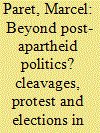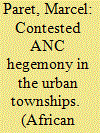|
|
|
Sort Order |
|
|
|
Items / Page
|
|
|
|
|
|
|
| Srl | Item |
| 1 |
ID:
160682


|
|
|
|
|
| Summary/Abstract |
Declining electoral support for South Africa's ruling party, the African National Congress (ANC), suggests a potential weakening of the anti-apartheid nationalism that defined the immediate post-apartheid period. Using two surveys of voters in primarily poor and working-class black areas, conducted during the 2014 (national) and 2016 (local) elections, as well as three case studies of protest by workers, poor communities and students, this article examines the social cleavages and political dynamics that underpinned deepening political competition. Results show that voting decisions varied according to gender, age, ethnicity and receipt of welfare benefits. Different public provisions mattered most during national versus local elections, demonstrating that voters paid close attention to government operations. Underscoring political fluidity, some instances of protest reinforced ANC dominance while others fed into support for the opposition. The findings challenge notions of uncontested one party dominance, revealing instead that some poor black voters are critically evaluating the ANC's performance and developing oppositional political identities.
|
|
|
|
|
|
|
|
|
|
|
|
|
|
|
|
| 2 |
ID:
147229


|
|
|
|
|
| Summary/Abstract |
Is ANC hegemony stable or in decline? The 2014 election provided support for both interpretations, as the ANC registered its fifth consecutive victory but with a declining share of the vote, especially in urban areas. In what ways and among which groups is the ANC maintaining its hegemony? This study draws on an exit survey of 3,782 voters in sixteen communities in and around Gauteng Province, with a particular focus on impoverished and protest-affected urban townships. The results show that while the ANC continues to derive power from its role as the party of national liberation, pluralistic party competition is deepening. This competition centres on the quality of governance and material provision such as houses and social grants, and is refracted through divisions based on age, gender, race, and ethnicity. Evidence also suggests that protests in communities and workplaces are translating into support for opposition parties such as the EFF, implying a broader challenge to ANC hegemony.
|
|
|
|
|
|
|
|
|
|
|
|
|
|
|
|
| 3 |
ID:
152664


|
|
|
|
|
| Summary/Abstract |
“South Africa’s organized labor movement is now, arguably, weaker and more fragmented than at any other time in the past three decades. Disagreement over how unions should relate to the ruling party, the ANC, is central to this fragmentation.” Eighth in a series on labor relations around the world.
|
|
|
|
|
|
|
|
|
|
|
|
|
|
|
|
| 4 |
ID:
191643


|
|
|
|
|
| Summary/Abstract |
Do racial identities determine voting behaviour in post-apartheid South Africa? To address this question, we draw from a representative sample of 3,905 registered voters in five metropolitan municipalities: Johannesburg, Tshwane, Durban, Cape Town, and Nelson Mandela Bay. Our findings are mixed. On the one hand, Black voters were significantly more likely to vote for the African National Congress, whereas Coloured, Indian, and especially white voters were more likely to vote for the Democratic Alliance. This contrast comes into particular focus when we examine how voters acted over the course of a three-election period. On the other hand, race was far from a guaranteed predictor, not the least because many chose to abstain from voting—a trend that extended, though unevenly, to all racial groups. Importantly, though, the electorate did not split between party loyalists and consistent abstainers. Instead, fluidity predominated: About half of the electorate changed positions between elections, either by switching between parties or between voting and abstaining. Our findings thus demonstrate what we call ‘racialized fluidity’: Many voters are changing their voting decision from one election to the next, but in the aggregate, racial identity remains correlated with voting decisions.
|
|
|
|
|
|
|
|
|
|
|
|
|
|
|
|
|
|
|
|
|